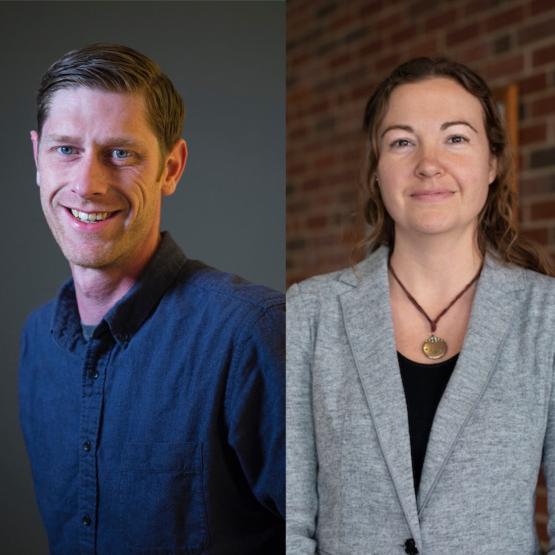
New study reveals how Ohio hospitals and health departments can join forces to tackle poor mental health, substance use and obesity

Ohio University researchers Dr. Cory Cronin, Dr. Berkeley Franz and undergraduate student Anne Mathew coauthored a paper published in the prestigious “Health Affairs” journal, exploring the alignment between hospitals and public health departments in addressing community health needs in the state of Ohio.
The paper, part of the June issue of “Health Affairs” focused on reimagining public health, continues the work Cronin and Franz have done over the last six years in examining how hospitals across the nation influence population health within their respective communities. This study marks the first instance that the research team is using coding protocol, developed by Franz, to analyze all the hospitals in a single state, as well as documents from public health departments.

“Multisector collaboration is critical for improving population health,” Cronin, an associate professor and co-director of the Institute to Advance Health Equity (ADVANCE) in the College of Health Sciences and Professions, said. “Improving the alignment between nonprofit hospitals and local health departments is one way we can achieve health improvement and currently, a number of states are exploring policies to facilitate such collaboration, Ohio being one of the latest to implement such policies.”
The impetus for the study stemmed from new policy requirements in Ohio mandating hospitals and public health departments to report on community investments and align their efforts with a statewide planning process. The findings serve as a crucial baseline for tracking alignment post-implementation of these policies and identifying areas necessitating greater collaboration, particularly in addressing social determinants of health.
The researchers compared the alignment in identified and addressed needs between nonprofit hospitals and local health departments and found low alignment between hospitals and health departments, particularly concerning the social determinants of health, despite both entities having formal responsibilities to their communities.
This misalignment underscores the importance of multisector collaboration in addressing critical public health needs.
“Alignment is critical to study because while these organizations have different missions, they both have formal responsibilities to the communities they serve,” Franz, Osteopathic Heritage Foundation Ralph S. Licklider, D.O. Endowed Faculty Fellow in Population Health Science and associate professor in the Heritage College of Osteopathic Medicine, explained. “Ideally, these organizations would work together to address critical public health needs, but this can only happen if they identify and address the same needs. Importantly, there was low alignment between hospitals and health departments for the social determinants of health. We know social factors are incredibly important for shaping health outcomes and encouraging multisector collaboration to address social issues should be a priority in Ohio.”
According to Cronin, the top identified health needs found by both hospitals and health departments include mental health, substance use and obesity.
“Alignment across organizations was high among the top needs such as mental health and substance use but varied more among less commonly identified needs,” Cronin explained. “Hospitals and health departments both offer different resources and we found that health departments were more responsive to social determinants than hospitals. By understanding these key takeaways, hospitals and health departments may be able to better serve their communities and policies can be created to consider how to promote collaboration between the two to meet community needs where they are at.”
Mathew, a senior Honors Tutorial College student in the neuroscience program, played a pivotal role as the primary data analyst for the study. Her meticulous work involved reading and analyzing extensive documents from both hospitals and health departments, contributing significantly to the research while providing her with critical skills and experience for her future career goals.
She coded the community health needs assessments (CHNA) and improvement strategies (IS) so they would be compiled into one document which could then be further analyzed. This involved searching and finding each hospital's CHNA and IS, reading through each document, and following the coding protocol to determine their alignment with any of the 17 common health needs. During her research, she discovered that over 90% of local health departments identified social determinants of health as a top need compared to 53% of hospitals.
“I learned that there are no small roles when it comes to research. A seemingly menial and tedious task at the time resulted in an analysis that carries significant weight, particularly in our understanding of community health in Ohio. I can now see my contribution as part of a larger effort and bigger picture,” Mathew, who has been mentored by Cronin throughout her undergraduate career, added.
Cronin applauded the work of his student, noting that being published as an undergraduate is a remarkable achievement and that her involvement in the study provided invaluable insights into health policy and research.
“I am so grateful for the supportive faculty encouraging students like me to engage in meaningful research,” Mathew said. “It has been an incredible honor to have worked with Dr. Cronin, Dr. Franz, and the rest of the team to get this paper published.”
In conjunction with the release of the June issue, Cronin spoke during a webinar on June 5 on the findings from their study, as well as next steps in addressing community health needs. He was also featured in a podcast talking broadly on public health.
The study was also coauthored by Simone Rauscher Singh of the University of Michigan, Ashlyn Burns and Valerie A. Yeager of Indiana University, Neeraj Puro of Florida Atlantic University, and Tatiane Santos of Tulane University.
